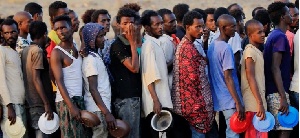 Ethiopians who fled fighting in Tigray queue for food at Um-Rakoba camp on the Sudan-Ethiopia border
Ethiopians who fled fighting in Tigray queue for food at Um-Rakoba camp on the Sudan-Ethiopia border
Ethiopia said on Saturday its forces seized another town in their advance on the capital of the northern Tigray region, Mekelle, and rebuffed an African Union push to mediate the conflict.
The government has said it will soon reach Mekelle after taking surrounding towns, the latest being Adigrat – the second-largest city in Tigray about 116km (72 miles) north of the capital.
“Our defence forces are currently marching on Mekele,” the Ethiopia State of Emergency Fact Check, a government agency, said.
The Tigray People’s Liberation Front (TPLF) in a statement said there had been “heavy bombardment” of Adigrat, but did not say who was now in control.
A federal government statement said on Friday that Ethiopian troops took the towns of Axum and Adwa.
Assertions on all sides are hard to verify because phone lines and internet have been down since the beginning of the conflict on November 4 and media are largely barred.
Ethiopia denied talks on the growing conflict in Tigray were imminent, just hours after three African former presidents were named to help mediate the two-week-old crisis.
In a statement on Saturday, Prime Minister Abiy Ahmed – last year’s Nobel Peace Prize winner – praised his army’s advance.
“Our forces have now fully liberated Adigrat town from TPLF militia as of today. Together with the rest of Ethiopia, we will work to ensure that all humanitarian needs will be addressed,” said Abiy.
“The overall safety and well-being of the people of Tigray is of paramount importance to the federal government and we will do all that is necessary to ensure stability prevails in the Tigray region and that our citizens are free from harm and want.”
Ethiopian troops are taking towns and advancing on Mekelle despite resistance from regional forces who have used bulldozers to plough up roads and are putting up resistance, the Addis Ababa government said.
A hint of the devastation can be seen in satellite images provided to the Reuters news agency by commercial space company Maxar Technologies. Destroyed buildings lined the main road in the town of Dansha, where the conflict broke out, the images showed.
A high-ranking Tigrayan official on Friday accused government forces “wanton” killing and called on the international community to do more to help.
“[Federal] forces are very much interested in wanton killing of civilians, wanton bombardment of towns,” Tigray presidential adviser Getachew Reda said during a news briefing.
Humanitarian crisis
Hundreds, possibly thousands of people have been killed, more than 30,000 refugees have fled into Sudan, and Tigrayan forces have fired rockets at Ethiopia’s Amhara region and the neighbouring nation of Eritrea.
The AU announced the appointment of former Presidents Joaquim Chissano of Mozambique, Ellen Johnson-Sirleaf of Liberia, and Kgalema Motlanthe of South Africa as special envoys.
“The primary task of the special envoys is to engage all sides to the conflict with a view to ending hostilities, creating conditions for an inclusive national dialogue to resolve all issues that led to the conflict, and restoring peace and stability to Ethiopia,” the AU said in a statement.
The Ethiopian government has repeatedly said it will not engage in talks with the TPLF, which it regards as a renegade administration, pointing to what the government says was a surprise attack the group allegedly launched on federal troops in Dansha, sparking the conflict.
“News circulating that the envoys will be travelling to Ethiopia to mediate between the federal government and TPLF’s criminal element is fake,” a government task force on Tigray tweeted on Saturday.
200,000 refugees
On Friday, UN Secretary-General Antonio Guterres told reporters Ethiopia was not interested in external mediation.
“Until now, there has not been acceptance by the Ethiopian authorities of any form of external mediation,” he said.
He also called for the opening of humanitarian corridors to assist civilians caught in fighting in the Tigray region.
The UN said it was making plans for as many as 200,000 refugees fleeing to neighbouring Sudan, itself suffering from a severe economic crisis. It now hosts some 36,000 Ethiopians, with many in transit camps near the border, according to Sudan’s refugee commission.
Many said they left behind modest lives as farmers with just the clothes on their backs to escape intense bombings, shootings and knife attacks in Tigray. Family members and relatives were left behind, their fate unknown, they said.
The TPLF is extremely popular in its home region and dominated national politics from 1991 until Prime Minister Abiy took power in 2018.